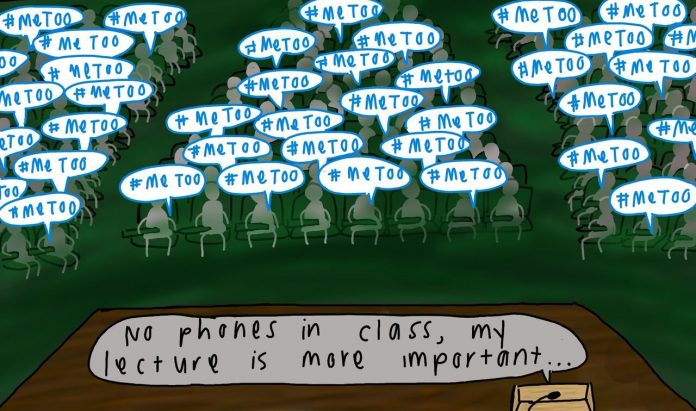Jasmine Moreno
Sexual misconduct and abuse is an issue prevalent not only in Hollywood; it is also lurking in the shadows of the Isla Vista community. Recently, however, victims and allies have started a new dialectic with the hashtag #MeToo. From student social media to flower-crowned sculptures on campus, #MeToo illustrates the fight for a future in which victims are no longer shamed or ignored, and abusers are forced to acknowledge their vituperative behavior through consequences for their actions.
#MeToo is a recently emerging type of campaign that utilizes the fast-paced universe of social media to instantly reach a mass audience. With the click of a mouse or tap of a phone, the movement is able to cross oceans and break through language barriers in order to unite millions as one voice. The meaning behind the movement is simple and interactive; use the hashtag if you have ever been a victim of sexual assault.
Since activist Tarana Burke’s establishment of the hashtag, thousands of survivors have come forth to share their own horrific experiences of abuse or to simply stand in solidarity with others through social media like Facebook, Instagram, and Twitter. The movement’s effects on the Isla Vista community are becoming increasingly apparent as recent allegations of sexual misconduct in local establishments continue to surface. Each story aids in pulling back the drapes of a dominant narrative where victims’ voices are silenced.
For example, I.V. community members were appalled earlier this month when iV Menus owner Patrick Galoustian made headlines in his arrest under charges of sexual assault and kidnapping. Yet this event is only the tip of an iceberg composed of voice-muffling figures and tendency of avoidance. Sexual violence exists within almost every inch of our tight-knit college-town; it lingers within popular eateries and tiptoes through frat houses and student dorms.
UCSB second-year Jasmin Abdul voices growing concern in community members. “I don’t think there is enough emphasis on programs and talks that teach students not to sexually assault others rather than programs that teach us not to get sexually assaulted,” Abdul said. “It is not enough to simply address the issue. Rather, together as a community, as students, and as friends, we must actively do what we can to help others if we see something happening.”
The common goal across the community is to battle both the protection of abusers and the silencing of victims. Students are working together with organizations like the Resource Center for Sexual and Gender Diversity (RCSGD) and the Women’s Center to confront the prior-ignored issue of sexual assault in I.V. These organizations act as safe-places and resource centers for UCSB student representation and guidance.
Like every controversial campaign, #MeToo faces some criticisms and implications. While the entire basis of the hashtag is inclusiveness, some argue the movement is hypocritical due to lack of representation for all victims.
A quick click on the official website shows that the original focus of #MeToo is women of all kind. Critics and even supporters debate that while this focus is voicing one prior-silenced issue, it is actually disregarding another, that LGBTQ persons are left out of the dialogue. However, others disagree with this opinion. Some people say that just because the platform tends to be used mostly by women, this does not denote exclusiveness.
RCSGD student worker Justice Dumlao reflects the latter by stating, “I think it’s pretty inclusive to everyone who wants to speak out, of course it is majority of women who are speaking out…but I don’t think that by any means it’s being exclusive towards [others] because it’s not specifically just asking for women to speak out.” Dumlao continues, “There has been also been men who have spoken out in this movement.”
The vital question that activists and students ask is: Where do we go from here? Dumlao suggests listening to and taking survivors stories seriously, then taking it a step further by “going out to events [in support of the cause] and speaking up when you hear someone saying something that falls under the umbrella of what sexual harassment is.”
Similarly, at a November function for solidarity with survivors of sexual assault, Campus Advocacy, Resources & Education (CARE) director Briana Conway exhorted the power of speaking up and said, “when you act as a leader and demonstrate care for the survivors in your community you use your voice and actions to serve as a bystander who has the courage to intervene…you are leading a critical effort to create a UCSB culture that is free from violence.”
Sexual assault is a deeply embedded issue in the UCSB community’s past. Each individual that composes the student body has the power to contribute to the problem or to the solution. The important choice to contemplate is whether you will decide to stand in unison with survivors or to remain seated in support of abusers.











